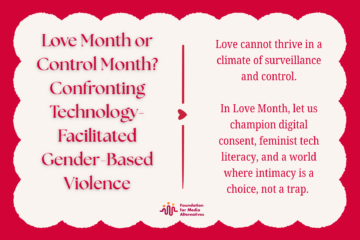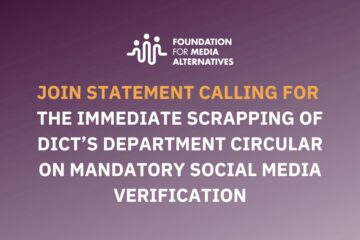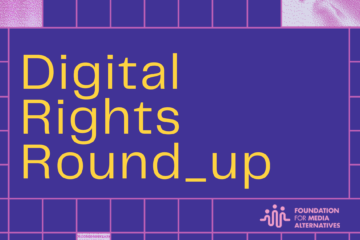Keeping the Internet Open
Six years ago, the Foundation for Media Alternatives (FMA) led the development of the Philippine Declaration on Internet Rights and Principles, a document that codifies the internet that Filipinos aspire for. The PH Declaration was the result of a series of consultations, discussions, debates, and crowdsourced ideas from multi-stakeholders. It calls for affordable and quality access for all; a democratized architecture of the internet based on open standards; freedom of expression and association online; the right to privacy and data protection; gender equality on the internet; access to knowledge and information; socio-economic empowerment and innovation; digital literacy and digital skills; safety and security on the internet; and, sustainable use of ICTs.
Much has happened since the PH Declaration was launched in November 2015. The number of internet users have increased and continues to grow. The internet has developed and evolved fast, and it uses have been diverse. We have been witnesses to how the internet has benefited citizens, and yet it has also been used by some to spread misleading and false information, to harass and intimidate others, and to censor speech. Given all these, the PH Declaration and its call for a free, inclusive, safe and open internet remains relevant.
But what is an open internet and why does it matter?
By design, the open internet is distributed. It is owned in part by everyone and as a whole by no one. It is open because it uses free and publicly available standards and anyone can access and built on. Such openness helps promote competition and innovation of applications and services. Consumers can make their own choices and decide which content to access, what to create and share with others.
A free and open internet is essential to a democracy. It allows citizens to freely express themselves, to share information, and to debate and discuss ideas. It strengthens democratic engagement and participation in the cultural, social and political spheres.
Various advocacy and stakeholder groups like FMA have come up with initiatives such as documents and statements calling for an open internet to promote and protect human rights.
Social media platforms like Twitter developed guiding principles for regulation that calls for the protection and expansion of an open internet built on trust and anchored on the protection of human rights.
However, there are threats and challenges to an open internet. The internet has also been used to promote violence, especially among women, to promote inequality, to silence critics, and censor speech. Some have even resorted to internet shutdowns.
An open internet matters to the holding of democratic processes. As the Philippine national election draws near, how do we ensure that the internet remains free and open?
To learn more about what an open internet is and why it matters, FMA will be holding a discussion on the topic Advocating for a Free and Open Internet in the Philippines on Twitter Spaces (@fma_ph) on December 9, starting at 7:00pm. The discussants for this event are FMA’s Executive Director Lisa Garcia; Twitter’s Head of Public Policy, Government and Philanthropy, Southeast Asia, Lynn Ampolpittayanant; Angelo Gutierrez, Independent Researcher; and, Mr. Lito Averia, IT consultant and Founder of PH-CERT.



0 Comments